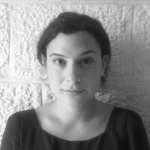Becoming an unwitting part of the story
JERUSALEM, October 26, 2015 – The attack ended up being only a small paragraph in our main story on Wednesday, October 14, on the escalating violence between Israelis and Palestinians. It didn’t warrant more. Around 7:00 pm that evening, at the central bus station in Jerusalem, a Palestinian pulled a knife from his pocket and lunged at an Israeli woman, lightly wounding her, before being killed by a guard seconds later. Such an attack can occur at any time of the day in Israel during the current spike in tensions, particularly in Jerusalem.
In the nearly two years that I have worked as a reporter for the AFP bureau here, I have covered a dozen attacks like this. I go through a by now familiar routine in covering them -- I get as close as possible to the scene, push my way through the crowd, find one of our photographers. Then, with a notepad in hand, follow the medics, find witnesses, try to look this way and that to make out any traces left on the ground, get the names of the victims and sometimes the attacker, watch angry demonstrators arrive. All the while staying in constant touch with the bureau. My job is to try and understand what happened and describe it. No matter how close I get, I am always at a distance afforded me by my profession – I’m an observer, not a participant.
But on that Wednesday nearly two weeks ago, this distance shattered and I didn’t describe what happened, I felt it.
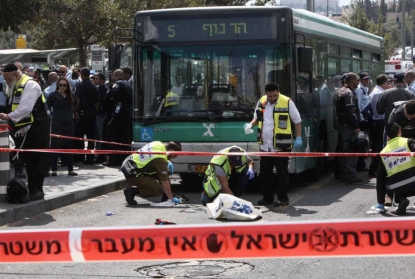 Israeli volunteers clean up blood stains after a Palestinian man stabbed a Jewish man in Jerusalem in October. (AFP / Gali Tibbon)
Israeli volunteers clean up blood stains after a Palestinian man stabbed a Jewish man in Jerusalem in October. (AFP / Gali Tibbon)When I left the bureau that day, I told myself I was going to take the train home to Tel Aviv. In this time of rising violence, it’s a bit safer than a bus, even if it does take a bit longer. And then I changed my mind. I tell myself that I will not give in to fear, the fear of others, of Israelis, the fear about which I write in my stories.
Israel is a small country and nearly every Israeli had been touched in some way by the violence of the first and the second Palestinian intifadas, the uprisings that began against Israeli occupation in 1987 and 2000. That fear, of being caught up in the violence, is again gripping Israelis during the current spike in attacks, which has seen assailants strike in various places in the country – at a mall in a chic suburb of Tel Aviv, on an isolated road in the center of the country, in a bus in Jerusalem. The attacks can occur at any time of the day, anywhere and affect anyone. Including me.
I had just gotten onto the bus to Tel Aviv when I heard the screams, then the shots, then the sirens. I see people running in all directions. I don’t understand if it’s a bomb, a false alarm, if it’s already over or still happening. I don’t understand what I am doing in the middle of all the chaos. I don’t understand anything.
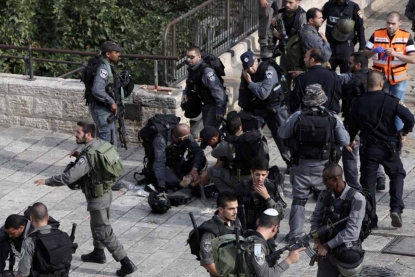 Israeli border guards give first aid to a police officer who was stabbed by a Palestinian in the Old City of Jerusalem. (AFP / Gali Tibbon)
Israeli border guards give first aid to a police officer who was stabbed by a Palestinian in the Old City of Jerusalem. (AFP / Gali Tibbon)Dazed, my first reflex is to call the bureau chief in Jerusalem, Laurent Lozano, to try and describe what I am seeing. But he quickly tells me that I have to get myself to a safe place. A journalist in this region of the world is often witness to violence, as seen by the daily production of my AFP colleagues. That’s logical – the job of a reporter is to go where the violence happens to observe and record what happened.
But when you’re hit by violence that you didn’t look for, you’re in another world. That day it was Laurent, ten kilometers from the scene, who, following a police update to the media, gave me an idea of what was actually happening where I was.
Just as I begin to get my bearings, I hear someone scream: “Inside! Everyone inside!” Masked, heavily armed men seem to be everywhere. I quickly realize that I’m witnessing a raid by the Yamam anti-terrorist police unit. They’re looking for other possible assailants who could be hiding in the bus terminal.
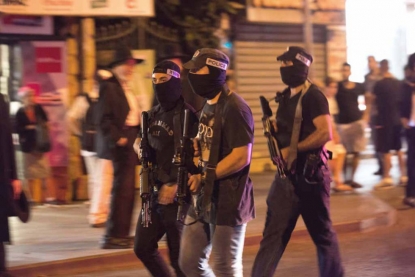 Israeli police search the site following a stabbing near the central bus station in Jerusalem. (AFP / Menahem Kahana)
Israeli police search the site following a stabbing near the central bus station in Jerusalem. (AFP / Menahem Kahana)I hide under the counter of a cigarette vendor, who brandishes a hammer in his hand, while another man squeezed under with us holds a long knife. They seem in a trance, ready to defend themselves. Crouched on the ground, I hear the sound of boots, the sounds of weapons being loaded. Some people sob, others swear, while still others vow vengeance.
Then suddenly, after several long minutes, a police commando runs out of the terminal. The scene of him running unleashes panic. Everyone bursts out of his or her hiding place and runs in the opposite direction. I do too. I fall. The only thing I see in front of me is a large army backpack that a soldier has abandoned on the ground. I hide behind this khaki mound, but I know that I am completely exposed. I close my eyes. I tell myself that it’ll soon be over.
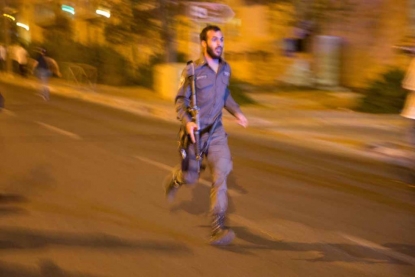 An Israeli policeman rushes to the site of a stabbing near Jerusalem's central bus terminal. (AFP / Menahem Kahana)
An Israeli policeman rushes to the site of a stabbing near Jerusalem's central bus terminal. (AFP / Menahem Kahana)And then nothing.
False alarm, there was no “second terrorist.”
Several days later, at a bus terminal in Beersheba in the south of the country, a 29-year-old Eritrean immigrant is shot by a security guard and then beaten by a mob after being mistaken for such a “second terrorist,” following an attack in which a gunman killed a soldier and wounded another 10 people. The Eritrean, who died of his injuries a day later, was simply hiding with the others following the attack.
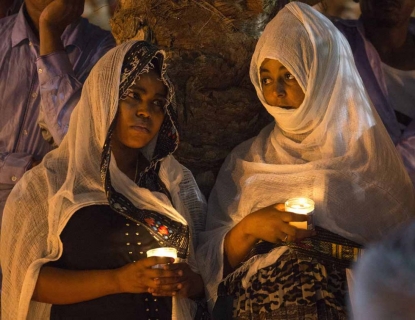 Members of the Eritrean community in Israel attend a memorial for an Eritrean asylum seeker who died of injuries after being shot by a guard and beaten by a mob after being mistaken for an attacker. (AFP / Jack Guez)
Members of the Eritrean community in Israel attend a memorial for an Eritrean asylum seeker who died of injuries after being shot by a guard and beaten by a mob after being mistaken for an attacker. (AFP / Jack Guez)This collective, potentially murderous panic, this irrational reaction that can overcome an entire crowd that’s gripped by “it’s either me or them” mentality, is a well-known phenomenon in the region. I have seen and felt it. I can describe it and understand it, without going so far as justifying it.
That Wednesday I did not witness and describe the violence from the distance of a journalist. I felt it, I was in middle of it. Will the experience help me better understand the tension gripping Israelis and Palestinians during this latest round of violence in the region? Will the experience help me do my job?
The answer is yes. But I would have preferred to have avoided the experience.
Daphne Rousseau is an AFP journalist based in Jerusalem. Follow her on Twitter @daphnerousseau
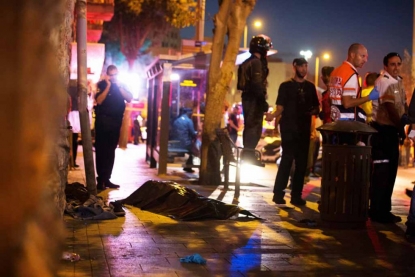 The body of an attacker who stabbed a woman near Jerusalem's central bus terminal lies on the ground after he was shot dead. (AFP / Menahem Kahana)
The body of an attacker who stabbed a woman near Jerusalem's central bus terminal lies on the ground after he was shot dead. (AFP / Menahem Kahana)

